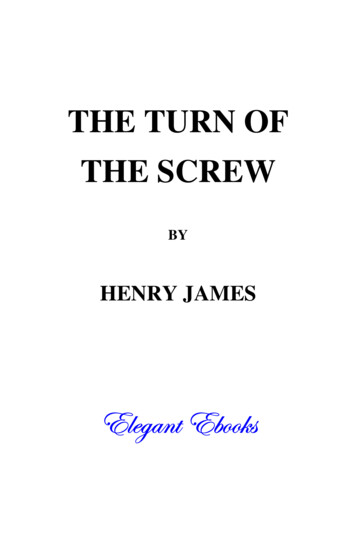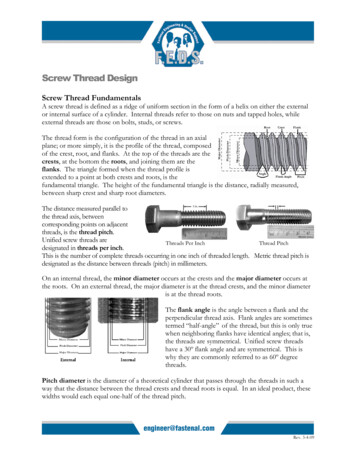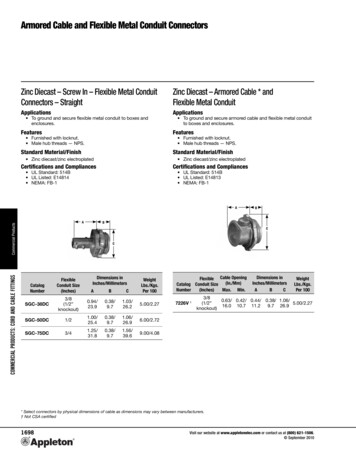
Transcription
THE TURN OFTHE SCREWBYHENRY JAMES7 WYS f f 77 T a a ] e
COPYRIGHT INFORMATIONBook: The Turn of the ScrewAuthor: Henry James, 1843–1916First published: 1898The original book is in the public domain in the UnitedStates and in most, if not all, other countries as well. Readersoutside the United States should check their own countries’copyright laws to be certain they can legally download thisebook. The Online Books Page has an FAQ which gives asummary of copyright durations for many other countries, aswell as links to more official sources.This PDF ebook wascreated by José Menéndez.
The Turn of the ScrewTHE story had held us, round the fire, sufficiently breathless,but except the obvious remark that it was gruesome, as, onChristmas Eve in an old house, a strange tale shouldessentially be, I remember no comment uttered till somebodyhappened to say that it was the only case he had met inwhich such a visitation had fallen on a child. The case, I maymention, was that of an apparition in just such an old houseas had gathered us for the occasion—an appearance, of adreadful kind, to a little boy sleeping in the room with hismother and waking her up in the terror of it; waking her notto dissipate his dread and soothe him to sleep again, but toencounter also, herself, before she had succeeded in doingso, the same sight that had shaken him. It was thisobservation that drew from Douglas—not immediately, butlater in the evening—a reply that had the interestingconsequence to which I call attention. Someone else told astory not particularly effective, which I saw he was notfollowing. This I took for a sign that he had himselfsomething to produce and that we should only have to wait.We waited in fact till two nights later; but that same evening,before we scattered, he brought out what was in his mind.“I quite agree—in regard to Griffin’s ghost, or whateverit was—that its appearing first to the little boy, at so tenderan age, adds a particular touch. But it’s not the firstoccurrence of its charming kind that I know to have involveda child. If the child gives the effect another turn of the screw,what do you say to two children—?”3
4THE TURN OF THE SCREW“We say, of course,” somebody exclaimed, “that theygive two turns! Also that we want to hear about them.”I can see Douglas there before the fire, to which he hadgot up to present his back, looking down at his interlocutorwith his hands in his pockets. “Nobody but me, till now, hasever heard. It’s quite too horrible.” This, naturally, wasdeclared by several voices to give the thing the utmost price,and our friend, with quiet art, prepared his triumph byturning his eyes over the rest of us and going on: “It’sbeyond everything. Nothing at all that I know touches it.”“For sheer terror?” I remember asking.He seemed to say it was not so simple as that; to bereally at a loss how to qualify it. He passed his hand over hiseyes, made a little wincing grimace. “For dreadful—dreadfulness!”“Oh, how delicious!” cried one of the women.He took no notice of her; he looked at me, but as if,instead of me, he saw what he spoke of. “For generaluncanny ugliness and horror and pain.”“Well then,” I said, “just sit right down and begin.”He turned round to the fire, gave a kick to a log,watched it an instant. Then as he faced us again: “I can’tbegin. I shall have to send to town.” There was a unanimousgroan at this, and much reproach; after which, in hispreoccupied way, he explained. “The story’s written. It’s in alocked drawer—it has not been out for years. I could write tomy man and enclose the key; he could send down the packetas he finds it.” It was to me in particular that he appeared topropound this—appeared almost to appeal for aid not tohesitate. He had broken a thickness of ice, the formation ofmany a winter; had had his reasons for a long silence. Theothers resented postponement, but it was just his scruplesthat charmed me. I adjured him to write by the first post and
HENRY JAMES5to agree with us for an early hearing; then I asked him if theexperience in question had been his own. To this his answerwas prompt. “Oh, thank God, no!”“And is the record yours? You took the thing down?”“Nothing but the impression. I took that here”—hetapped his heart. “I’ve never lost it.”“Then your manuscript—?”“Is in old, faded ink, and in the most beautiful hand.”He hung fire again. “A woman’s. She has been dead thesetwenty years. She sent me the pages in question before shedied.” They were all listening now, and of course there wassomebody to be arch, or at any rate to draw the inference.But if he put the inference by without a smile it was alsowithout irritation. “She was a most charming person, but shewas ten years older than I. She was my sister’s governess,”he quietly said. “She was the most agreeable woman I’veever known in her position; she would have been worthy ofany whatever. It was long ago, and this episode was longbefore. I was at Trinity, and I found her at home on mycoming down the second summer. I was much there thatyear—it was a beautiful one; and we had, in her off-hours,some strolls and talks in the garden—talks in which shestruck me as awfully clever and nice. Oh yes; don’t grin: Iliked her extremely and am glad to this day to think she likedme too. If she hadn’t she wouldn’t have told me. She hadnever told anyone. It wasn’t simply that she said so, but thatI knew she hadn’t. I was sure; I could see. You’ll easilyjudge why when you hear.”“Because the thing had been such a scare?”He continued to fix me. “You’ll easily judge,” herepeated: “you will.”I fixed him, too. “I see. She was in love.”
6THE TURN OF THE SCREWHe laughed for the first time. “You are acute. Yes, shewas in love. That is, she had been. That came out—shecouldn’t tell her story without its coming out. I saw it, andshe saw I saw it; but neither of us spoke of it. I remember thetime and the place—the corner of the lawn, the shade of thegreat beeches and the long, hot summer afternoon. It wasn’ta scene for a shudder; but oh—!” He quitted the fire anddropped back into his chair.“You’ll receive the packet Thursday morning?” Iinquired.“Probably not till the second post.”“Well then; after dinner—”“You’ll all meet me here?” He looked us round again.“Isn’t anybody going?” It was almost the tone of hope.“Everybody will stay!”“I will—and I will!” cried the ladies whose departurehad been fixed. Mrs. Griffin, however, expressed the needfor a little more light. “Who was it she was in love with?”“The story will tell,” I took upon myself to reply.“Oh, I can’t wait for the story!”“The story won’t tell,” said Douglas; “not in any literal,vulgar way.”“More’s the pity, then. That’s the only way I everunderstand.”“Won’t you tell, Douglas?” somebody else inquired.He sprang to his feet again. “Yes—tomorrow. Now Imust go to bed. Good-night.” And quickly catching up acandlestick, he left us slightly bewildered. From our end ofthe great brown hall we heard his step on the stair;whereupon Mrs. Griffin spoke. “Well, if I don’t know whoshe was in love with, I know who he was.”“She was ten years older,” said her husband.
HENRY JAMES7“Raison de plus—at that age! But it’s rather nice, hislong reticence.”“Forty years!” Griffin put in.“With this outbreak at last.”“The outbreak,” I returned, “will make a tremendousoccasion of Thursday night;” and everyone so agreed withme that, in the light of it, we lost all attention for everythingelse. The last story, however incomplete and like the mereopening of a serial, had been told; we handshook and“candlestuck,” as somebody said, and went to bed.I knew the next day that a letter containing the key had,by the first post, gone off to his London apartments; but inspite of—or perhaps just on account of—the eventualdiffusion of this knowledge we quite let him alone till afterdinner, till such an hour of the evening, in fact, as might bestaccord with the kind of emotion on which our hopes werefixed. Then he became as communicative as we could desireand indeed gave us his best reason for being so. We had itfrom him again before the fire in the hall, as we had had ourmild wonders of the previous night. It appeared that thenarrative he had promised to read us really required for aproper intelligence a few words of prologue. Let me say heredistinctly, to have done with it, that this narrative, from anexact transcript of my own made much later, is what I shallpresently give. Poor Douglas, before his death—when it wasin sight—committed to me the manuscript that reached himon the third of these days and that, on the same spot, withimmense effect, he began to read to our hushed little circleon the night of the fourth. The departing ladies who had saidthey would stay didn’t, of course, thank heaven, stay: theydeparted, in consequence of arrangements made, in a rage ofcuriosity, as they professed, produced by the touches withwhich he had already worked us up. But that only made his
8THE TURN OF THE SCREWlittle final auditory more compact and select, kept it, roundthe hearth, subject to a common thrill.The first of these touches conveyed that the writtenstatement took up the tale at a point after it had, in a manner,begun. The fact to be in possession of was therefore that hisold friend, the youngest of several daughters of a poorcountry parson, had, at the age of twenty, on taking servicefor the first time in the schoolroom, come up to London, intrepidation, to answer in person an advertisement that hadalready placed her in brief correspondence with theadvertiser. This person proved, on her presenting herself, forjudgment, at a house in Harley Street, that impressed her asvast and imposing—this prospective patron proved agentleman, a bachelor in the prime of life, such a figure ashad never risen, save in a dream or an old novel, before afluttered, anxious girl out of a Hampshire vicarage. Onecould easily fix his type; it never, happily, dies out. He washandsome and bold and pleasant, off-hand and gay and kind.He struck her, inevitably, as gallant and splendid, but whattook her most of all and gave her the courage she afterwardsshowed was that he put the whole thing to her as a kind offavour, an obligation he should gratefully incur. Sheconceived him as rich, but as fearfully extravagant—saw himall in a glow of high fashion, of good looks, of expensivehabits, of charming ways with women. He had for his owntown residence a big house filled with the spoils of travel andthe trophies of the chase; but it was to his country home, anold family place in Essex, that he wished her immediately toproceed.He had been left, by the death of their parents in India,guardian to a small nephew and a small niece, children of ayounger, a military brother, whom he had lost two yearsbefore. These children were, by the strangest of chances for a
HENRY JAMES9man in his position—a lone man without the right sort ofexperience or a grain of patience—very heavily on his hands.It had all been a great worry and, on his own part doubtless,a series of blunders, but he immensely pitied the poor chicksand had done all he could: had in particular sent them downto his other house, the proper place for them being of coursethe country, and kept them there, from the first, with the bestpeople he could find to look after them, parting even with hisown servants to wait on them and going down himself,whenever he might, to see how they were doing. Theawkward thing was that they had practically no otherrelations and that his own affairs took up all his time. He hadput them in possession of Bly, which was healthy and secure,and had placed at the head of their little establishment—butbelow stairs only—an excellent woman, Mrs. Grose, whomhe was sure his visitor would like and who had formerlybeen maid to his mother. She was now housekeeper and wasalso acting for the time as superintendent to the little girl, ofwhom, without children of her own, she was, by good luck,extremely fond. There were plenty of people to help, but ofcourse the young lady who should go down as governesswould be in supreme authority. She would also have, inholidays, to look after the small boy, who had been for aterm at school—young as he was to be sent, but what elsecould be done?—and who, as the holidays were about tobegin, would be back from one day to the other. There hadbeen for the two children at first a young lady whom theyhad had the misfortune to lose. She had done for them quitebeautifully—she was a most respectable person—till herdeath, the great awkwardness of which had, precisely, left noalternative but the school for little Miles. Mrs. Grose, sincethen, in the way of manners and things, had done as shecould for Flora; and there were, further, a cook, a housemaid,
10THE TURN OF THE SCREWa dairywoman, an old pony, an old groom, and an oldgardener, all likewise thoroughly respectable.So far had Douglas presented his picture when someoneput a question. “And what did the former governess dieof?—of so much respectability?”Our friend’s answer was prompt. “That will come out. Idon’t anticipate.”“Excuse me—I thought that was just what you aredoing.”“In her successor’s place,” I suggested, “I should havewished to learn if the office brought with it—”“Necessary danger to life?” Douglas completed mythought. “She did wish to learn, and she did learn. You shallhear tomorrow what she learnt. Meanwhile, of course, theprospect struck her as slightly grim. She was young, untried,nervous: it was a vision of serious duties and little company,of really great loneliness. She hesitated—took a couple ofdays to consult and consider. But the salary offered muchexceeded her modest measure, and on a second interview shefaced the music, she engaged.” And Douglas, with this, madea pause that, for the benefit of the company, moved me tothrow in—“The moral of which was of course the seductionexercised by the splendid young man. She succumbed to it.”He got up and, as he had done the night before, went tothe
3 The Turn of the Screw THE story had held us, round the fire, sufficiently breathless, but except the obvious remark that it was gruesome, as, on Christmas Eve in an old house, a strange tale should essentially be, I remember no comment uttered till somebody











